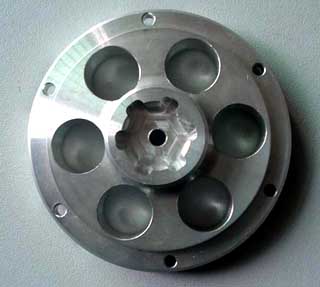The United States Imposes Tariffs On Steel And Aluminum Products Against China?
Shouting "free, fair and wise trade", US President Trump announced on the 1st that local time will formally sign an order next week to impose tariffs of 25% and 10% on imported steel and aluminum products, respectively. Although many analysts have said that Trump's move is mainly aimed at China, the reality is that the vast majority of steel exports to the United States are its allies. According to an American media report, Trump hopes that this measure will apply to all countries.

On the 1st of the local time, the US stock market crashed. The three major indices all fell by more than 1%. The Dow fell by 420 points. The market is worried that the US government's increase of tariffs will ignite the global trade war and cause retaliatory measures by Canada, China, and the European Union. On the 2nd, Asian and European stock markets followed the US lower, the Nikkei 225 Index fell by 2.5%, and the European Stokes 600 Index fell by nearly 1%.
According to the BBC, more than 100 countries and regions in the world export steel to the United States. Among them, Canada ranks first, and most of the top ten countries and regions are allies of the United States, including South Korea, Japan, and Germany. “These major U.S. allies are really angry with the tariff operation.” CNN stated that European Commission Chairman Juncker stated on the 1st that the White House “openly interfered to protect U.S. domestic industries” and that the EU “will not sit idly by.” Canadian Foreign Minister Freeland stressed that any measures that treat Canadian trade as a national security threat are completely "inappropriate." German Foreign Minister Gabriel called for the EU on the 2nd and must "resolutely respond." The French economy minister warned that the trade war between the United States and Europe will "only lose."
Many American media asserted that Trump’s move refers to China. The Washington Post stated that the key to the US steel and aluminum industry's trouble is China. Last year, the global steel production capacity was over 700 million tons, which is 7 times the total consumption of the United States. China is a big producer and exporter of steel, and it is also one of the largest sources of excess capacity in steel production. However, according to data from the US Department of Commerce, the country’s imports of China’s steel last year accounted for only 2% of its total imports, and China did not even rank among the top ten countries in the largest steel import countries in the United States. From the perspective of China, the United States has not yet entered the top ten countries for export of Chinese steel products. This has a lot to do with previous US trade restrictions such as anti-dumping countervailing measures.
According to the analysis, with such a small amount of China Steel’s exports to the United States, it is difficult to establish such an allegation that the US steel industry is threatened by overcapacity in China. From the perspective of aluminum products, from January to October last year, the United States imported Chinese aluminum products accounted for 9.5% of its total imports. The British "Financial Times" stated that the US's tariff action will not have any serious impact on China, and the most direct impact will be on the United States' "military allies" of Canada, Japan and South Korea.
Wang Hejun, head of the Trade Relief Bureau of the Ministry of Commerce of China, said on the 2nd. Most of the steel and aluminum products imported by the United States are civilian low-end products and have not harmed their national security. "If the U.S. ultimate measures damage China's interests, China will work with other affected countries to take corresponding measures to safeguard their rights and interests."
When Trump announced that he wanted to raise tariffs, Liu He, the member of the Political Bureau of the CPC Central Committee and director of the Central Financial and Economic Leadership Group Office, was visiting the United States. Chinese Ministry of Foreign Affairs spokesperson Hua Chunying said on the 2nd that Liu He had a candid exchange with U.S. Treasurer Mr. Mu Nuchin, the White House National Economic Committee Director Cohen, and Trade Representative Lite Shizzle, creating the necessary conditions for further cooperation.


On the 1st of the local time, the US stock market crashed. The three major indices all fell by more than 1%. The Dow fell by 420 points. The market is worried that the US government's increase of tariffs will ignite the global trade war and cause retaliatory measures by Canada, China, and the European Union. On the 2nd, Asian and European stock markets followed the US lower, the Nikkei 225 Index fell by 2.5%, and the European Stokes 600 Index fell by nearly 1%.
According to the BBC, more than 100 countries and regions in the world export steel to the United States. Among them, Canada ranks first, and most of the top ten countries and regions are allies of the United States, including South Korea, Japan, and Germany. “These major U.S. allies are really angry with the tariff operation.” CNN stated that European Commission Chairman Juncker stated on the 1st that the White House “openly interfered to protect U.S. domestic industries” and that the EU “will not sit idly by.” Canadian Foreign Minister Freeland stressed that any measures that treat Canadian trade as a national security threat are completely "inappropriate." German Foreign Minister Gabriel called for the EU on the 2nd and must "resolutely respond." The French economy minister warned that the trade war between the United States and Europe will "only lose."
Many American media asserted that Trump’s move refers to China. The Washington Post stated that the key to the US steel and aluminum industry's trouble is China. Last year, the global steel production capacity was over 700 million tons, which is 7 times the total consumption of the United States. China is a big producer and exporter of steel, and it is also one of the largest sources of excess capacity in steel production. However, according to data from the US Department of Commerce, the country’s imports of China’s steel last year accounted for only 2% of its total imports, and China did not even rank among the top ten countries in the largest steel import countries in the United States. From the perspective of China, the United States has not yet entered the top ten countries for export of Chinese steel products. This has a lot to do with previous US trade restrictions such as anti-dumping countervailing measures.
According to the analysis, with such a small amount of China Steel’s exports to the United States, it is difficult to establish such an allegation that the US steel industry is threatened by overcapacity in China. From the perspective of aluminum products, from January to October last year, the United States imported Chinese aluminum products accounted for 9.5% of its total imports. The British "Financial Times" stated that the US's tariff action will not have any serious impact on China, and the most direct impact will be on the United States' "military allies" of Canada, Japan and South Korea.
Wang Hejun, head of the Trade Relief Bureau of the Ministry of Commerce of China, said on the 2nd. Most of the steel and aluminum products imported by the United States are civilian low-end products and have not harmed their national security. "If the U.S. ultimate measures damage China's interests, China will work with other affected countries to take corresponding measures to safeguard their rights and interests."
When Trump announced that he wanted to raise tariffs, Liu He, the member of the Political Bureau of the CPC Central Committee and director of the Central Financial and Economic Leadership Group Office, was visiting the United States. Chinese Ministry of Foreign Affairs spokesperson Hua Chunying said on the 2nd that Liu He had a candid exchange with U.S. Treasurer Mr. Mu Nuchin, the White House National Economic Committee Director Cohen, and Trade Representative Lite Shizzle, creating the necessary conditions for further cooperation.






